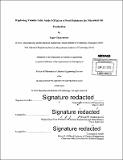Exploring volatile fatty acids (VFAs) as a novel substrate for microbial oil production
Author(s)
Chakraborty, Sagar, Ph. D. Massachusetts Institute of Technology
DownloadFull printable version (19.69Mb)
Other Contributors
Massachusetts Institute of Technology. Department of Chemical Engineering.
Advisor
Gregory Stephanopoulos.
Terms of use
Metadata
Show full item recordAbstract
Cost effective production of biofuels depends critically on feedstock cost and availability. As such, volatile fatty acids (VFAs) can play an important role in advancing sustainable biofuel production since they can be derived from low cost feedstock including gases and municipal solid waste. To this end, we studied fermentations of the oleaginous microbe Yarrowia lipolytica engineered for lipid overproduction. With acetate as sole carbon source, we conducted fed batch fermentations of Y. lipolytica in which acetic acid was maintained at low, non-inhibitory levels yielding high lipid titer of 50 g/L and productivity of 0.25 g/L/h, along with a lipid content of 60%. We also conducted fed batch fermentations with cell recycle to utilize dilute steams of acetic acid that essentially replicated the results of the fed batch process. Carbon balances were satisfied and no excess carbon dioxide production was detected beyond the amounts associated with biomass formation and product synthesis. Acetate is one member of the entire range of VFAs produced from municipal solid waste (MSW) via anaerobic digestion; thus, facilitating the use of MSW as a primary feedstock would be contingent on the ability of the above strain to grow on a mixture of VFAs. Given the insufficient literature examining microbial growth on VFAs, one of the goals of this project was to explore individual as well as mixed VFAs as a feedstock for Y.lipolytica. Dilute stream of mixed VFAs were successfully used as feed in bioreactor studies to obtain high cell density cultures. Similar results with respect to lipid production were obtained in comparison to the study on acetate. In addition, the microbe could tolerate perturbations in the feed composition and grow to similar cell densities. The success in establishing VFAs as a potential substrate for lipid accumulation in Yarrowia lipolytica raises the possibility of a two-stage commercial bioprocess enabling biodiesel production from MSW.
Description
Thesis: Ph. D., Massachusetts Institute of Technology, Department of Chemical Engineering, 2015. Cataloged from PDF version of thesis. Includes bibliographical references.
Date issued
2015Department
Massachusetts Institute of Technology. Department of Chemical EngineeringPublisher
Massachusetts Institute of Technology
Keywords
Chemical Engineering.